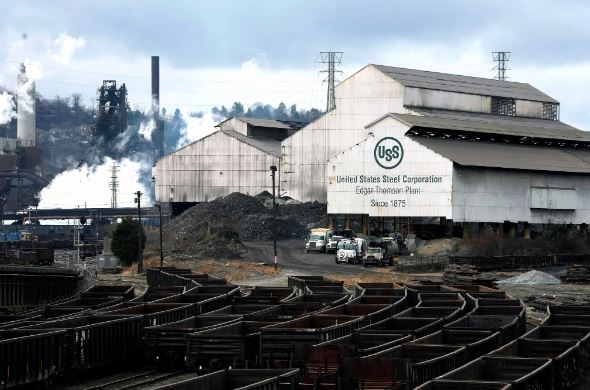The proposed acquisition of U.S. Steel by Japanese competitor Nippon Steel, a deal worth $14.1 billion, has put President Biden in a delicate position as he strives to rejuvenate the American industrial sector while navigating international alliances. The Biden administration is reviewing the takeover bid, expressing some unease about the deal. U.S. Steel, an iconic symbol of the nation’s lost manufacturing prowess, has faced challenges competing against cheap foreign metal and has been considering takeover offers for months.
This high-profile example underscores the complex political choices facing President Biden in his efforts to revitalize American industry, particularly regarding the creation and retention of high-paying union manufacturing jobs. The proposed acquisition has drawn attention from the United Steelworkers union and bipartisan senators, including those from swing states like Ohio and Pennsylvania. The senators argue that domestically owned steel production is crucial for U.S. manufacturing and supply chains, expressing concerns that a foreign owner might move U.S. Steel jobs and production overseas.
Senator Josh Hawley, a Republican from Missouri, emphasizes the importance of maintaining steel production in the country, stating, “This really should be a no-brainer.” Pressure from unions and senators is urging President Biden to reject the sale on national security grounds, highlighting the strategic significance of domestically owned steel production.
U.S. Steel executives argue that the deal would benefit workers and enhance the merged companies’ capabilities in steel production. They announced commitments from Nippon Steel to keep the company’s headquarters in Pittsburgh and honor the four-year collective bargaining agreement with the steelworkers’ union. However, concerns persist about the potential impact on national security and U.S. manufacturing jobs.
Supporters of the takeover bid caution against blocking the sale, emphasizing the risk of upsetting a crucial ally, Japan. President Biden has sought collaboration with Japan on various issues, including countering Chinese manufacturing and welcoming Japanese investment in new American manufacturing facilities. Wilbur Ross, former commerce secretary under President Trump and a steel industry veteran, argues that there is nothing in the deal that requires defense, and interference could strain geopolitical relations.
The Biden administration faces cross-pressures, with uncertainty about the fate of U.S. Steel if the deal is scuttled and whether blocking it would guarantee greater job security for the company’s nearly 15,000 North American employees. The challenges U.S. Steel has confronted over the years, including intense foreign competition, especially from China, have prompted various administrations to implement protectionist measures, such as tariffs and Buy America requirements.
Despite efforts to protect domestic steel makers, the United States has not seen a return to the levels of steel production witnessed in past decades. Recent presidents, including Biden and Trump, have aimed to bolster the domestic industry through a mix of subsidies, import restrictions, and Buy America provisions. However, these measures have not fully addressed the decline in domestic steel production or employment in the industry.
Senators, both Democrats and Republicans, are urging President Biden to review the proposed sale, emphasizing the role of the Committee on Foreign Investment in the United States (CFIUS). CFIUS, led by Treasury Secretary Janet L. Yellen, evaluates potential sales of American firms to foreign entities for potential national security threats. The senators contend that the sale should be scrutinized on these grounds, with the potential to suspend or block the deal.
President Biden has acknowledged the need for scrutiny, expressing concerns about the purchase of an iconic American-owned company by a foreign entity. The administration has emphasized the importance of national security and supply chain reliability in its review. The outcome of this high-stakes decision will not only impact the steel industry but also test President Biden’s commitment to revitalizing American manufacturing and navigating the delicate balance of international relations. The steelworkers’ union and senators are closely watching, emphasizing the significance of maintaining domestic steel production for the nation’s economic and strategic interests.

